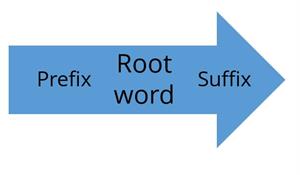
PUMPA - SMART LEARNING
எங்கள் ஆசிரியர்களுடன் 1-ஆன்-1 ஆலோசனை நேரத்தைப் பெறுங்கள். டாப்பர் ஆவதற்கு நாங்கள் பயிற்சி அளிப்போம்
Book Free DemoIn English, a word consists of three parts - root words, prefixes and suffixes.
A root word is a word that can form the basis of new words by adding affixes (prefixes or suffixes).
Prefixes and suffixes are not words by themselves, but they help in forming new words. A word that is added before a root word to form a new word is called prefix. A word added at the end of a root word to form a new word is called a suffix.

Prefixes are words added before a root word to derive a newer meaning. Let us explore the usage of prefixes in detail:
1. Prefixes that derive antonyms/opposites: The prefixes "anti", "de", "dis", "un", "in", "im", "ir" usually denote the opposite meaning of the root words.
Example:
social - antisocial
lock - unlock
agree - disagree
motivate - demotivate
active - inactive
reversible - irreversible
possible - impossible
2. Prefixes that mean "cause to": The prefix "en" usually denotes the causing effect.
Example:
able - enable (cause to able)
joy - enjoy
danger - endanger
3. Prefixes that mean "before to": The prefix "fore" usually denotes anything done before/earlier (denotes the verb).
Example:
cast - forecast
go - forego
father - forefather
4. Prefixes that mean "amongst": The prefix "inter" usually denotes amongst others.
Example:
national - international
state - interstate
5. Prefixes that mean "middle": The prefix "mid" usually denotes being in the middle part or position.
Example:
day - midday
night - midnight
week - midweek
ocean - mid-ocean
6. Prefixes that mean "doing again": The prefix "re" usually denotes repeating of an action.
Example:
start - restart
do - redo
write - rewrite
7. Prefixes that mean "too much": The prefix "over" usually denotes too much or a lot of
Example:
do - overdo
load - overload
8. Prefixes that mean "before": The prefix "pre" usually denotes previous to, before
Example:
historic - prehistoric
view - preview
plan - preplan
9. Prefixes that mean "under" and "above": The prefix "sub" usually denotes under, and "super" denotes above
Example:
text - subtext
marine - submarine
natural - supernatural
market - supermarket
10. Prefixes that mean "little or low": The prefix "under" usually denotes lesser
Example:
estimate - underestimate
age - underage
Here is a list of commonly used prefixes:
Prefix | Meaning | Examples |
| anti | against | antisocial |
| de, dis | opposite, not | dehydrate, disengage |
| en, em | cause to | enable |
| fore | before | forego |
| in, im | into, not | immoral, inedible |
| in, im, ir | not, opposite | impossible |
| inter | among | international |
| mid | middle | midway |
| mis | wrong | misunderstanding |
| non | not | nonsense |
| over | too much | overdose |
| pre | before | prehistoric |
| re | doing again | restart |
| semi | half | semi-finals |
| sub | under | submerged, subtext |
| super | above | supernatural |
| trans | across | transnational, transport |
| un | not, opposite | unlock |
| under | little | underestimate |
The prefixed words in the lesson "Learning the Game":
- Overawed
- Uncomfortable
- Transform
- Intense
- Inter - school
- Insane
- Impossible